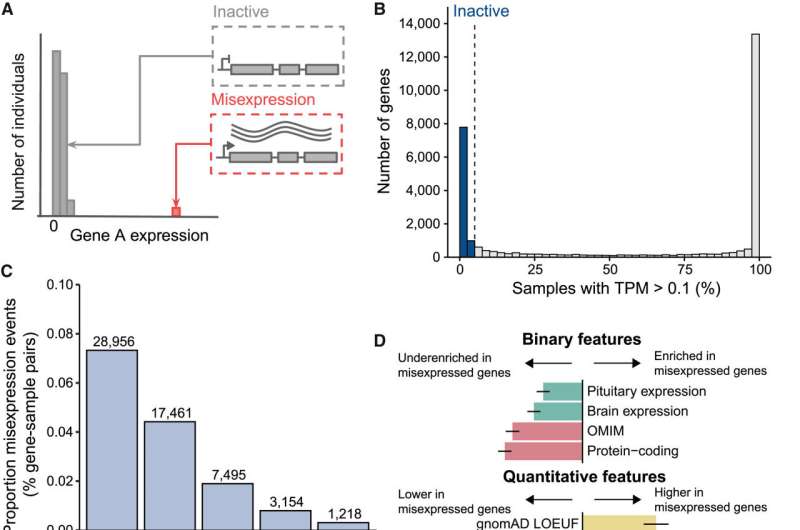This article has been reviewed according to Science X's editorial process and policies. Editors have highlighted the following attributes while ensuring the content's credibility:
fact-checked
peer-reviewed publication
trusted source
proofread
Scientists find 'gene misbehavior' is surprisingly widespread in healthy people

Scientists have uncovered that "gene misbehavior"—where genes are active when they were expected to be switched off—is a surprisingly common phenomenon in the healthy human population.
The team also identified several mechanisms behind these gene activity errors. This may help inform precision medicine approaches and enable the development of targeted therapies to correct expression.
Researchers from the Wellcome Sanger Institute, the University of Cambridge and AstraZeneca studied the activity of inactive genes in a large, healthy population for the first time. While rare at the individual gene level, they revealed misexpression is widespread across samples and involved more than half of the genes that should be inactive.
The findings, published July 24 in the American Journal of Human Genetics, shed new light on how our genetic code operates. The approach could be used in future research to investigate various complex diseases.
The human genome contains about 19,900 genes. These genes form part of the instruction manual for our bodies, encoding proteins needed to carry out cell functions. Proper gene regulation involves turning these gene instructions on and off as needed, depending on a cell's specific role or environmental factors. When this regulation fails and a typically inactive gene is activated, or "expressed," it can disrupt normal cell function.
While gene misexpression has previously been linked to several rare diseases, such as congenital limb syndromes, it is not known how often or why this may happen in the general population.
In this new study, researchers analyzed blood samples from 4,568 healthy individuals from the INTERVAL study. They used advanced RNA sequencing techniques to measure gene activity and whole genome sequencing to identify genetic changes behind irregular gene activity.
The team found that while misexpression events were rare at the individual gene level –occurring in only 0.07% of genes—nearly all samples—96%—had some misexpression, with over half of the normally inactive genes showing misexpression. They also found these events can be caused by rare structural changes in the DNA.
While these findings show that gene misbehavior is common, it may not always lead to health issues. This new understanding of the prevalence and mechanisms of gene misexpression provides a valuable tool for further investigation into the complexities of human genetics and disease. This could help in diagnosing and developing treatments for conditions caused by misexpression.
Thomas Vanderstichele, first author of the study at the Wellcome Sanger Institute, said, "Until now, we have been looking at disease risk through the lens of highly active genes. Our study reveals 'unusual' gene activity is far more usual than previously thought and we need to consider the full picture, including genes that shouldn't be active but sometimes are. This is a big step towards more personalized health care, enabling a more comprehensive understanding of all the ways our genes impact our health."
Dr. Katie Burnham, author of the study at the Wellcome Sanger Institute, said, "Interestingly, while over half of genes occasionally misexpress, we find certain critical genes, particularly those governing development, rarely make such mistakes. This suggests that when these essential genes do misexpress, the consequences for health and disease are likely to be more severe."
Dr. Emma Davenport, senior author of the study at the Wellcome Sanger Institute, said, "The work of this pioneering large-scale study is testament to the incredible 'genomics ecosystem' in Cambridge that brought together experts from the Sanger Institute, the University of Cambridge and AstraZeneca. The findings open avenues for research into gene misexpression across different tissues, to understand its role in various diseases and potential treatments."
More information: Thomas Vanderstichele et al, Misexpression of inactive genes in whole blood is associated with nearby rare structural variants, The American Journal of Human Genetics (2024). DOI: 10.1016/j.ajhg.2024.06.017



















